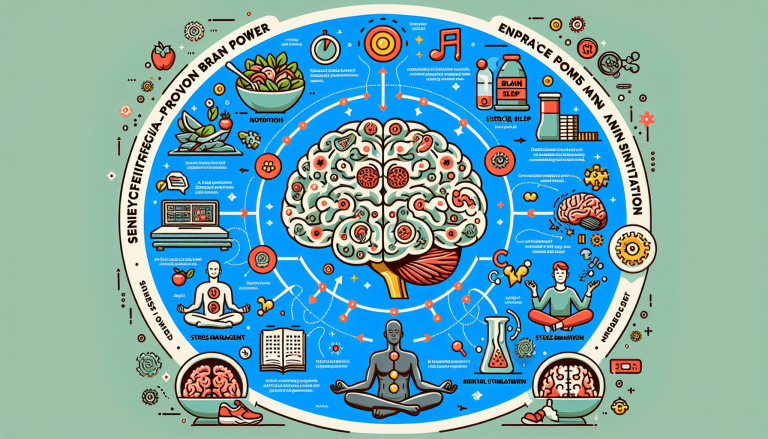What Happens If You Don’t Sleep?
We all know how important a good night’s sleep is, but have you ever wondered what happens if you don’t get enough shut-eye? Well, buckle up because we’re about to take you on a whirlwind journey through the consequences of sleep deprivation. From impaired concentration to a weakened immune system, your body and mind can experience a range of adverse effects when you neglect those precious hours of slumber. So, grab a cup of coffee, sit back, and prepare to discover the shocking repercussions of sleep deprivation.
Impaired Cognitive Functioning
Decreased focus and attention
Lack of sleep can significantly affect your cognitive functioning, particularly your ability to focus and pay attention. Without sufficient sleep, you may find it difficult to concentrate on tasks, leading to reduced overall productivity. You may also experience a decline in your ability to stay engaged and attentive during conversations or meetings. This can have negative consequences on your performance at work or in academic settings.
Poor decision-making abilities
Sleep deprivation can also impair your decision-making abilities. When you don’t get enough sleep, your brain’s ability to process information and make rational judgments becomes compromised. This can lead to poor decision-making in various aspects of your life, such as financial choices or relationship decisions. Sleep-deprived individuals are more likely to make impulsive and irrational decisions, which can have long-term consequences.
Memory problems
A lack of sleep can also affect your ability to form and retain memories. During sleep, memories are consolidated, and information learned throughout the day is processed. Without enough sleep, your brain struggles to consolidate new information into long-term memory. This can result in difficulties with recalling details, remembering important events, or even learning new skills. Lack of sleep can impair both short-term and long-term memory functions.
Mood Disorders
Increased irritability
One of the immediate effects of sleep deprivation is increased irritability. When you don’t get enough sleep, your emotional regulation system becomes compromised, leading to heightened irritability and emotional sensitivity. Small inconveniences or stressors that you would normally handle well may suddenly feel overwhelming and frustrating. This can strain relationships with others and make it challenging to navigate daily interactions.
Feeling depressed
Chronic sleep deprivation has been strongly linked to an increased risk of developing depression. Sleep and mood are intricately connected, and when you consistently lack sleep, it can trigger depressive symptoms. The disrupted sleep-wake cycle and imbalance of neurotransmitters in the brain caused by sleep deprivation can lead to feelings of sadness, hopelessness, and a general lack of interest in activities you once enjoyed.
Higher levels of anxiety
Sleep deprivation can also contribute to higher levels of anxiety. Lack of sleep can intensify your body’s stress response, making you more prone to anxiety and feelings of unease. Additionally, sleep deprivation affects your ability to regulate emotions, making it harder to manage anxious thoughts and feelings. As a result, you may experience heightened levels of anxiety and find it challenging to cope with everyday stressors.

Weakened Immune System
Reduced ability to fight off infections
A lack of sleep weakens your immune system, making you more susceptible to infections and illnesses. During sleep, your body releases immune-boosting proteins and cells that help fight off pathogens and infections. Without adequate sleep, these defenses are compromised, and your ability to ward off common colds, flu, and other infections is significantly reduced. This can lead to more frequent illnesses and longer recovery times.
Increased risk of chronic illnesses
In addition to weakened immune function, insufficient sleep also increases your risk of developing chronic illnesses. Research has shown associations between chronic sleep deprivation and conditions such as diabetes, cardiovascular disease, obesity, and even certain types of cancer. The exact mechanisms underlying these relationships are still being studied, but it is clear that lack of sleep has a profound impact on our overall health and increases the risk of long-term health problems.
Weight Gain and Metabolic Imbalances
Increased appetite
Sleep deprivation has been linked to an increase in appetite. When you don’t get enough sleep, the hormones that regulate hunger and satiety, such as ghrelin and leptin, become imbalanced. This can result in an increased desire for high-calorie, sugary, and fatty foods, leading to weight gain over time. Additionally, sleep deprivation can also affect the reward centers in your brain, making unhealthy food choices more enticing.
Higher risk of obesity
The combination of increased appetite, poor food choices, and decreased physical activity due to fatigue can contribute to weight gain and a higher risk of obesity. Chronic sleep deprivation has been associated with an increased likelihood of developing obesity, which in turn increases the risk of various health problems such as heart disease, diabetes, and joint issues. Maintaining a healthy sleep pattern is crucial for maintaining a healthy weight.
Imbalanced hormone levels
Sleep deprivation disrupts the delicate balance of hormones in your body, particularly those involved in regulating metabolism and appetite. The lack of sleep affects the production of hormones such as insulin, cortisol, and growth hormones, which can lead to imbalances and metabolic dysregulation. This disruption in hormone levels can further contribute to weight gain, metabolic imbalances, and an increased risk of developing chronic conditions.

Impaired Physical Performance
Decreased coordination
Lack of sleep negatively impacts your physical coordination and motor skills. When you’re sleep-deprived, your reaction times are slower, and your hand-eye coordination becomes compromised. This can affect various activities that require fine motor skills, such as driving, playing sports, or even simple tasks like typing or writing. Impaired coordination increases the risk of accidents and injuries in both professional and everyday life situations.
Slower reaction times
Sleep deprivation slows down your brain’s processing speed, leading to slower reaction times. This can be especially dangerous in situations that require quick reflexes, such as driving or operating machinery. Slower reaction times increase the risk of accidents and can have severe consequences for your safety and the safety of others around you.
Reduced endurance
A lack of sleep can also impair your physical endurance and stamina. When you’re sleep-deprived, your body doesn’t have sufficient time to recover and recharge, leading to increased fatigue and decreased physical performance. Whether you’re an athlete, a student, or simply trying to stay active, inadequate sleep can hinder your ability to perform at your best and achieve optimal physical fitness.
Higher Risk of Accidents
Increased likelihood of workplace and traffic accidents
Sleep deprivation significantly increases the likelihood of workplace accidents and errors. When you’re tired, your attention, reaction times, and decision-making abilities are all impaired, making it more likely for mistakes to occur. In certain professions, such as healthcare, transportation, or manufacturing, the consequences of these accidents can be severe. It’s crucial to prioritize adequate sleep to ensure your safety and the safety of those around you.
Impaired driving skills
Drowsy driving is a serious problem that can have devastating consequences. Sleep deprivation affects your ability to stay alert, focus on the road, and react quickly to unexpected situations. Fatigue-related crashes are responsible for numerous injuries and fatalities each year. It’s essential to recognize the signs of drowsiness and never operate a vehicle when you haven’t had enough sleep. Your life and the lives of others on the road depend on it.
Cardiovascular Problems
Higher blood pressure levels
Lack of sleep can lead to higher blood pressure levels, even in otherwise healthy individuals. During quality sleep, your blood pressure naturally decreases. However, when you consistently don’t get enough sleep, this natural decrease is disrupted, causing your blood pressure to remain elevated. Over time, high blood pressure can increase the risk of developing cardiovascular diseases such as heart disease and stroke.
Increased risk of heart disease and stroke
Chronic sleep deprivation has been linked to an increased risk of heart disease and stroke. The elevated blood pressure caused by lack of sleep, along with other physiological changes, can contribute to the development of cardiovascular problems. Additionally, sleep deprivation can also affect other risk factors for heart disease, such as inflammation, blood clotting, and insulin resistance. Taking care of your sleep health is essential for maintaining a healthy heart and reducing the risk of these serious conditions.
Impact on Hormonal Health
Imbalanced production of growth hormones
Sleep plays a crucial role in hormone production and regulation, particularly the production of growth hormones. Growth hormones are essential for tissue repair, muscle growth, and overall physical development. However, when you don’t get enough sleep, the production of growth hormones can be disrupted, potentially affecting these vital processes. This imbalance can impede muscle recovery, delay healing from injuries, and hinder overall physical development.
Disrupted reproductive hormone levels
Sleep deprivation can also disrupt the delicate balance of reproductive hormones in both men and women. Inadequate sleep has been associated with decreased fertility, imbalances in estrogen and testosterone levels, and irregular menstrual cycles. These disruptions can make it more challenging to conceive and can have long-term implications for reproductive health. Prioritizing sleep is crucial for maintaining optimal reproductive function.
Increased Risk of Mental Health Disorders
Higher chance of developing anxiety disorders
Sleep deprivation is strongly linked to an increased risk of developing anxiety disorders. Lack of sleep affects the brain’s emotional regulation centers and increases the production of stress hormones. This can lead to heightened anxiety levels, intrusive thoughts, and difficulty managing everyday stressors. Ensuring you get enough sleep is essential for supporting your mental well-being and reducing the risk of anxiety disorders.
Increased risk of depression
Chronic sleep deprivation is a significant risk factor for developing depression. Sleep and mood are closely intertwined, and when you consistently don’t get enough sleep, it can disrupt the balance of neurotransmitters in the brain, leading to depressive symptoms. The lack of energy, low mood, and feelings of hopelessness commonly associated with depression can become more pronounced with persistent sleep deprivation. Taking care of your sleep hygiene is vital for maintaining good mental health.
Decreased Quality of Life
Overall reduced productivity and satisfaction
The cumulative effects of sleep deprivation can significantly diminish your overall productivity and satisfaction in life. With impaired cognitive functioning, mood disorders, and physical limitations, you may struggle to perform at your best in various areas of your life. Whether it’s at work, in relationships, or pursuing personal goals, lack of sleep can hinder your ability to fully engage and enjoy these aspects of life.
Poor physical and mental well-being
Sleep deprivation takes a toll on both your physical and mental well-being. Fatigue, increased risk of chronic illness, impaired cognitive function, and mood disturbances can all contribute to a decreased sense of well-being. Chronic sleep deprivation can leave you feeling physically drained, emotionally exhausted, and mentally foggy. Prioritizing good sleep habits is essential for promoting optimal physical and mental health, leading to an improved overall quality of life.
In conclusion, the impacts of not getting enough sleep are far-reaching and can affect various aspects of your life. From impaired cognitive functioning to increased risk of chronic illnesses, the consequences of sleep deprivation should not be overlooked. Prioritizing good sleep hygiene and ensuring you get enough restful sleep is crucial for maintaining optimal physical and mental health, enhancing quality of life, and maximizing your potential in all areas of life.
Additional Resources

I just watched this video explaining how brilliant scientists managed to fix insomnia, lack of sleep and 30 other types of sleep disorders.
It was the biggest trial ever run on 7,000 people, from mild to severe insomnia. You can check their findings here.







